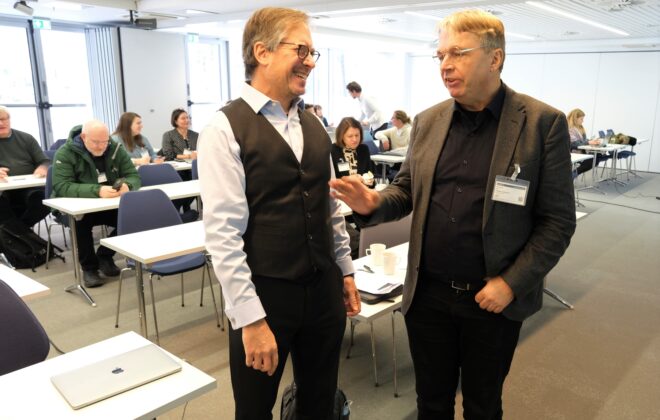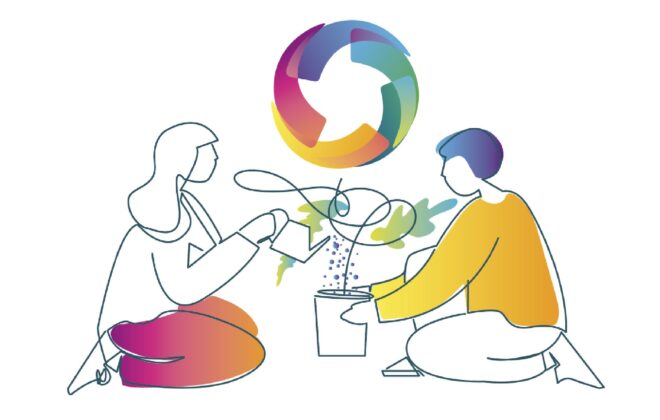Challenged in new directions
Is this mission impossible? Is it risky business?
These were among the questions asked at the seminar on Futures Literacy held at The Research Council of Norway.
The seminar 1st December in Oslo was initiated by AFINO Research Centre in collaboration with The Research Council of Norway, NIFU, University of Stavanger and UNESCO Futures Literacy Norway.
How to use the future literacy in politics, policy development and leadership was the big questions to be explored during the day.
The host at the seminar was Per M. Koch, editor of the magazine Forskningspolitikk, Senior Adviser at NIFU, co-chairholder of the Norwegian UNESCO Chair on Leadership, Innovation and Anticipation and project associate in the AFINO project Learning arenas through future literacy laboratories.
New ways
The invitation for the seminar underlined the need for this kind of meeting places:
“We are living in a turbulent and unpredictable time where it is difficult to find explanations and solutions to the challenges the public, private and voluntary sectors faces. Climate crisis, populism and political polarization, demographic change and the aging population can serve as examples. Old practice often fails to meet such challenges.
However, there is a lot of competence, knowledge and creativity in Norwegian society. We can use this insight when people with different backgrounds get the opportunity to meet, explore and define challenges and opportunities together. In this seminar – led by Riel Miller, Head of Futures Literacy, UNESCO – we will explore how we can use futurism in analysis, strategic thinking and policy, and which cultures and methods of leadership enable organizations and companies to better cope with an uncertain future.”
Rethinking
– Are we witnessing the birth of a new discipline, head of Futures Literacy in UNESCO, Riel Miller asked the around thirty participants at the seminar at The Research Council. He talked about how to use futures literacy in innovation policy and transformation and pointed out that futures literacy is one way of training people’s imagination.
– We need to go deeper! We need to rethink our position and integrate complexity, he said.

A Norwegian example
Already in the frontline in Norway on how to use futures literacy, is the social entrepreneur from Bergen, Fremtenkt.
At the seminar Ragnhild Nabben and Sveinung Sundfør Sivertsen talked about how they have created futures workshops, in the work on changes in the district Åsane in Bergen.
– Åsane is like many other districts, characterized by thoroughfares and parking lots, they explained.
Together with Bergen municipality, Fremtenkt have invited to several workshops, where inhabitants, companies and others were welcomed to contribute with their thoughts and ideas on a sustainable future in Åsane.

Leadership
During the seminar, the still quite fresh UNESCO Chairholder of Futures Literacy in Norway, Rune Todnem By from The University of Stavanger, inspired the participants with his talk about Reframing Leadership and Organizational Practice.
– We need to bring our companies more problems! We must have the courage to ask about the problems and we need to act on the input, he said.
In addition to stimulating time for small talk in coffee breaks and lunch break, the host Per Koch invited representatives from Digital Life Norway and AFINO Research Centre, to share some of their experiences on futures literacy and responsible research and innovation at the seminar.

It was Elisabeth Gulbrandsen in The Research Council of Norway who asked the questions, referred to in the introductory part.
The special advisor pointed out that the uncertainty and challenges in foresight studies, partly is because the outcome is immeasurable. Gulbrandsen nevertheless encouraged the participants at the seminar to keep up activities like AFINO Research School, to improve the ability to anticipate the impacts and consequences of research and innovation.
– Let’s make research and innovation a problem, the advisor from The Research Council commented, at the end of the seminar.



